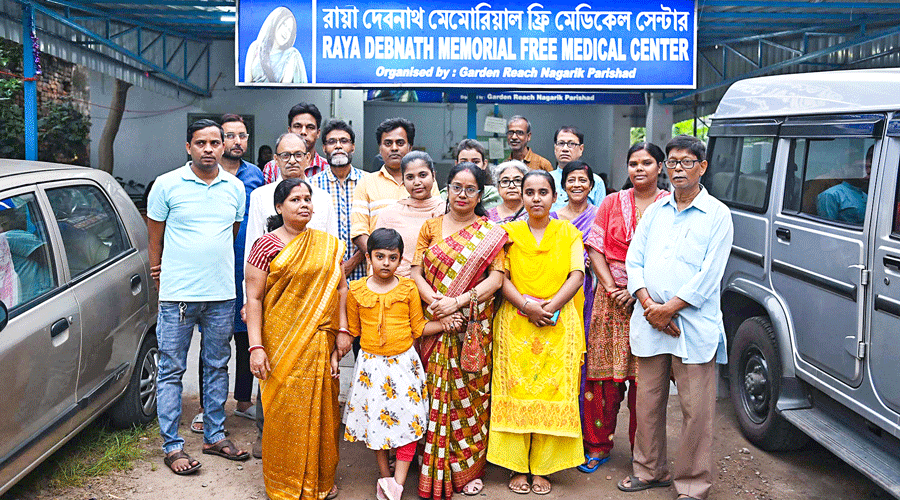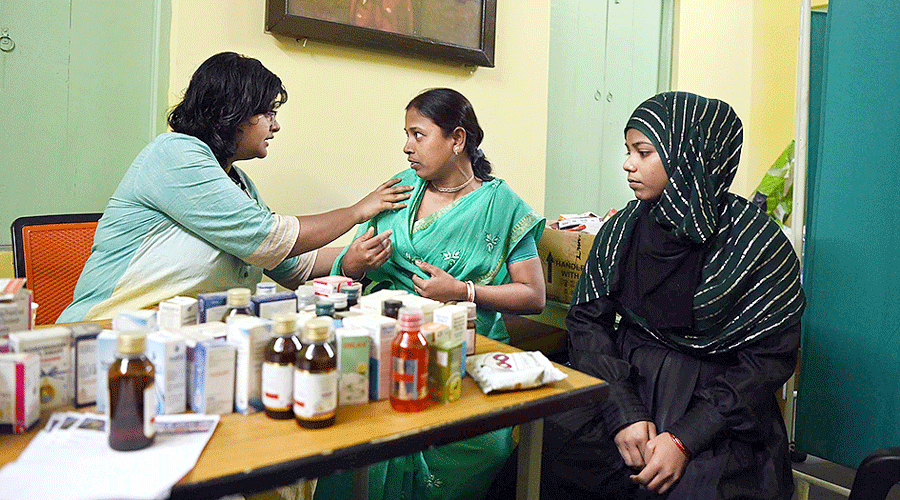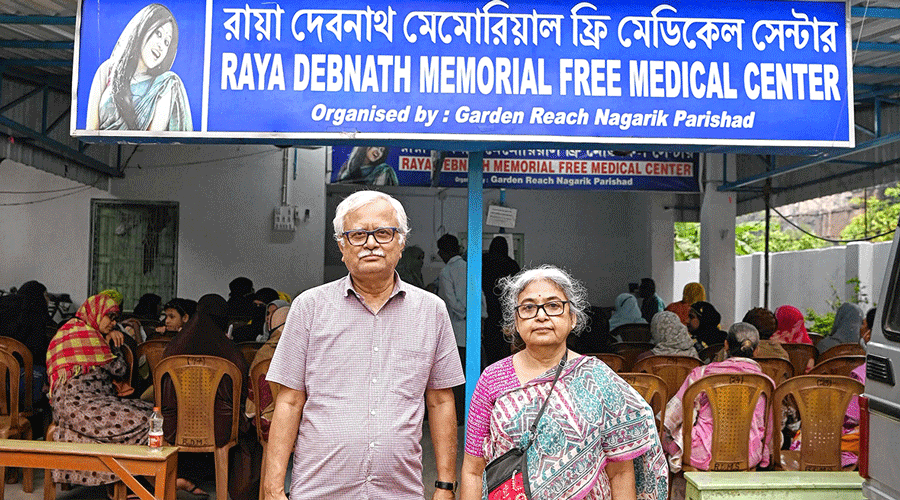The loss of a young daughter can crush the lives of many parents.
But instead of being overcome by grief, a Kolkata couple have been celebrating the memory of their only child by changing the lives of hundreds of people in an impoverished, minority-dominated pocket on the eastern fringes of the city.
Kushal Debnath and Alpana Dutta, both in their mid-60s, have been the driving force behind the Raya Debnath Free Medical Clinic in Metiabruz in southwest Kolkata, which completed two years this February.

Volunteers who work for the Raya Debnath Free Medical Clinic. Gautam Bose
The two, lifelong crusaders for human rights and communal amity, like to think of the clinic as “a memorial” to a cheerful girl who grew up to be a woman who believed that India was an inclusive and secular country.
The clinic, on Paharpur Road in the interiors of Metiabruz, provides free treatment to residents of the area, the majority of them Muslims and struggling to make ends meet.
The list of volunteers, which includes Hindus and Muslims alike, is a testament to an India that Raya believed in, her parents said.

A doctor checks a patient at the clinic. Gautam Bose
The clinic, organised under the banner of the Raya Debnath Memorial Society, is open on Sundays, Tuesdays and Fridays. When this newspaper visited the clinic on a Friday, around two dozen women were waiting.
A man at the counter wrote down their names one by one.
Rehana Bibi said she had diabetes, Tabassum Ara said she kept having bouts of gut pain and Salma Khatun had swollen feet.
All of them, and most of the visitors The Telegraph spoke to, were repeat visitors.
“The nearby government hospital is always busy. It is not easy to get a doctor there. Private hospitals are out of our reach,” said Ara, who does embroidery work to sustain her family. She has three children. Her husband is jobless, she said.
The Metiabruz Super-Specialty Hospital is not far from the clinic.
Priti Goswami, the doctor, arrived at the clinic around 4.45pm and went into a room meant for consultations.
The compound has a courtyard, a waiting area with a roof, and two rooms, one for consultation and the other for storing medicines.
“The majority of the women are from socio-economically marginalised families. Many of them suffer from anaemia, fungal infections and gastritis. Their conditions suggest malnourishment, irregular eating habits and unhygienic living conditions. Usually, they eat after everyone else in the family has eaten,” said Goswami, a junior doctor in the Emergency department of a government medical college.
A group of people, including friends and associates of Kushal, Alpana and Raya, together run the clinic. There are a handful of doctors who take turns to visit on each of the three days. The entire project is volunteer-led. The patients are given free medicines, sourced from donations by volunteers andtheir friends.
The clinic is also a testament to a collaboration between Hindus and Muslims, which goes beyond mere tolerance, something that Nobel laureate Amartya Sen calls Yukta Sadhana and keeps stressing to keep communal forces at bay.
Ashrafi Prasad, 81, the senior-most volunteer, was cleaning water bottles when this newspaper visited the clinic. Six decades ago, Prasad, a Brahmin from a village in Uttar Pradesh’s Gorakhpur, came to Kolkata to work in a factory in Metiabruz.
Prasad, a “deeply religious” man, became best friends with colleague Mohammad Aziz, a resident of Metiabruz. The closure of one factory after another, including their own, spurred them into a struggle for workers' rights.
“We fought for survival. We fought for workers’ rights. That fight is far from over but a new demon has reared its head. The demon of religious polarisation. I am a Brahmin. I pray regularly. There is nothing in my religion that preaches hatred towards any other religion,” Prasad told this newspaper.
Aziz passed away in 2019, aged 65. Now, his nephew, Istiaque Alam, 43, is a volunteer at the clinic.
“Prasad chacha often chats with me about the days gone by. For me, he is no less than my own uncle,” said Alam. The woman the clinic is named after, Raya Debnath, was a young rights activist and a popular face in the protests against the citizenship thrust of the Narendra Modi regime. She died of cardiac failure on August 2, 2020. She was 36.
“Raya believed in an India for all. Metiabruz and Garden Reach were like the extensions of her home. She spent many nights at the Park Circus Maidan with the women protesting against the Citizenship Amendment Act. She went to the capital with food and medicines for the victims of the northeast Delhi riots,” said Kushal Debnath, Raya’s father.
The first few months after her death were devastating and the couple could hardly organise themselves.
“But as time passed, we realised that we should keep cherishing her memory instead of only lamenting her passing away,” said Debnath, a veteran rights activist.
From the Kanoria Jute Mill movement to the Bhangar power grid protests, Debnath has been at the forefront of what he called “campaigns for the working classes”.
He is also one of the founding members of a platform called Bengal Against Fascist RSS-BJP.
The forum came into being to resist the citizenship thrust of the Narendra Modi regime. In the run-up to the Bengal polls in 2021, the forum launched the “No Vote To BJP” campaign.
“I thought none of the mainstream political parties was worth their salt. But my daughter always differentiated between the BJP and other parties. She would tell me that while other parties are authoritarian, only the BJP was fascist. With each passing day, I now realise she was right,” said Debnath.
The Raya Debnath Memorial Society also organises an annual lecture. “The topics are chosen from issues Raya was vocal about,” said mother Alpana.
The past speakers include historian Tanika Sarkar, who spoke on “Hindutva, Fascism and Women”, and retired bureaucrat Anita Agnihotri, who talked on “The Struggle of Marginalised Women and the Role of the State”. The society also runs a free school for marginalised children at Tallah Park.
